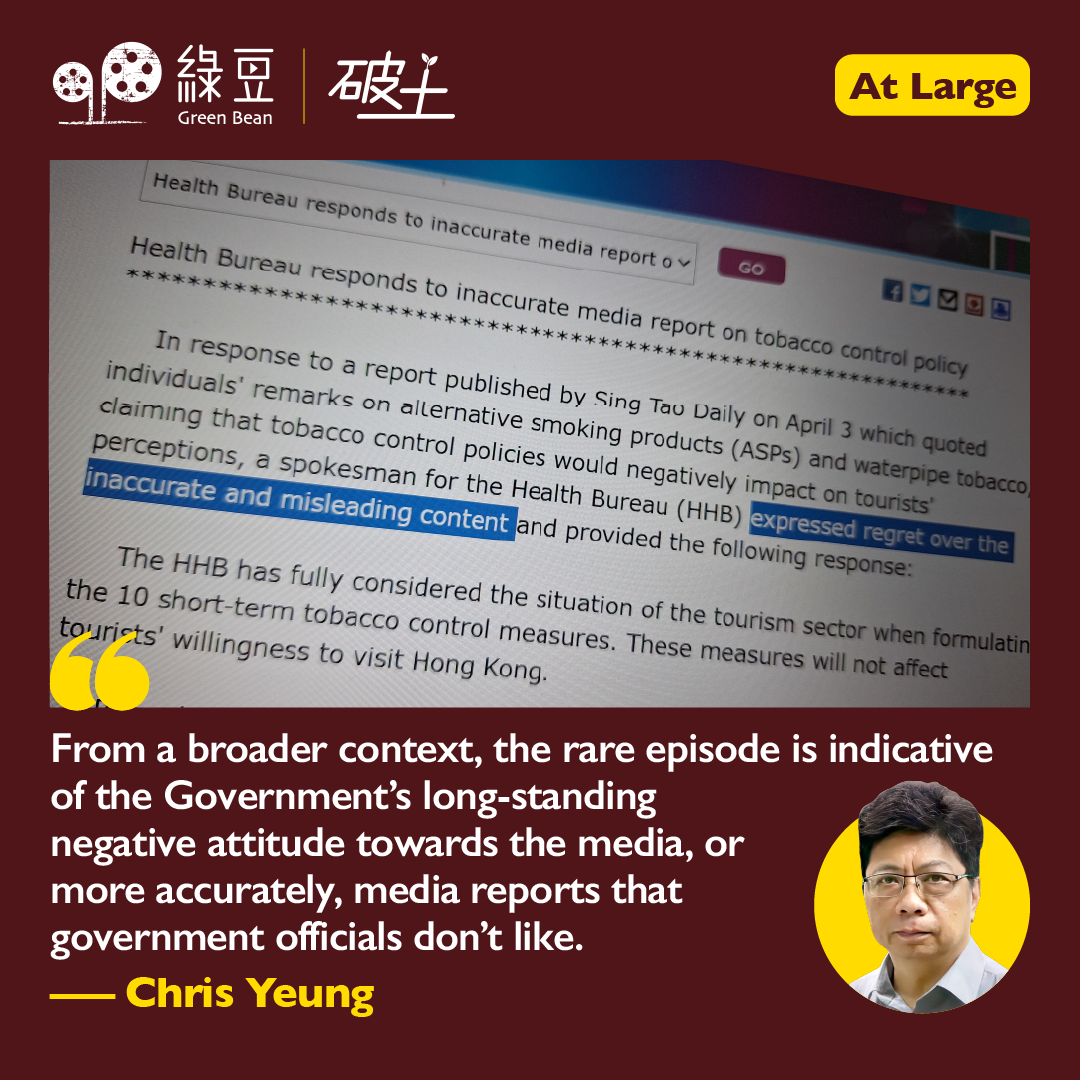Smoke gets in eyes of officials in tobacco report rebuttal

The Hong Kong Government under the leadership of John Lee has a penchant for issuing rebuttals to press reports that they deem as inaccurate, misleading, malicious and the like.
On the face of it, it is perfectly okay for the Government to rebuke criticism that they consider as unfair and groundless, clarify misinformation and correct misunderstanding.
But when a government rebuttal is issued primarily for the purpose of dismissing opinions that they disagree with and rejecting criticism they don’t want to listen, it risks causing more confusion among the populace and, worse, damage the credibility of the Government.
The Sing Tao Daily article
A case in point is a government rebuttal of a Chinese-language Sing Tao Daily article published on April 3. The report quoted comments from various figures about the potential negative effects of a set of fresh tobacco control measures on tourism in Hong Kong.
The report quoted comments from Legislative Council members, representatives from the bar industry and anti-smoking groups. Some expressed concerns that strict smoking regulations could adversely affect bar businesses and deter tourists.
In a corresponding editorial, Sing Tao Daily argued against sacrificing Hong Kong’s already sluggish economy and damaging the tourist experience to further reduce the already low smoking rates.
In a lengthy rebuttal, in both Chinese and English, issued late April 3 evening, the Health Bureau expressed regret over what it described as the report’s inaccuracies and misleading assertions.
Rejecting claims that the tobacco control measures would deter tourism, the bureau argued the opposite is true. It said citizens and tourists will enjoy a fresher environment and Hong Kong will be a healthier and more vibrant and attractive city for tourists.
On April 4, Sing Tao Daily published a half-page report, rebutting the Health Bureau’s rebuttal with “deep regret”. It maintains that its reports and commentaries are intended to accurately reflect the concerns from legislators and the relevant sectors, stimulating public debate on those issues.
It said: “Sing Tao News Corporation stands by its belief that public policies should be subject to extensive discussion, allowing for a variety of opinions that contribute to the development of well-rounded policies and uphold the core value of free speech.”
That the call for freedom of expression and the rebuttal of a government rebuttal came from one of the leading pro-government dailies could not be more intriguing and satirical.
The difference between facts and views
Owned by pro-Beijing business figures, the daily is widely known as a strong defender of the Government and the central authorities. It regularly features interviews of senior officials and exclusive stories of government policies.
The government rebuttal of reports in one of its friendly newspapers has been rare.
Why Sing Tao Daily became a target of government rebuttal remains unclear.
From a broader context, the rare episode is indicative of the Government’s long-standing negative attitude towards the media, or more accurately, media reports that government officials don’t like.
Take the reports of tobacco control as an example. It is a fact that there are mixed views over the proposed tobacco control measures, including their impacts, if any, on tourism, at least for now.
It is normal and also the duty of journalists to report various opinions fully and accurately. And it is common practice for newspapers to give their own views on various issues for a more thorough public debate.
To borrow the analogy of “half-filled glass”, it is accurate to say the glass is half full and not wrong or misleading to say the glass is half empty. Both are factually correct. To say it is half full or half empty is a matter of opinion that is allowed in a society with free speech.
Whether strict tobacco measures will deter tourists from coming to Hong Kong or do the opposite remains to be seen. Fact speaks louder than words. If health officials insist no, they should convince sceptics and critics with facts, not by rebuttal.
The swift rebuttal and statement of regret by the Health Bureau is not just regrettable but deplorable, raising questions about the officials’ understanding of the difference between facts and views and the importance of media freedom and free speech in Hong Kong.
▌[At Large] About the Author
Chris Yeung is a veteran journalist, a founder and chief writer of the now-disbanded CitizenNews; he now runs a daily news commentary channel on Youtube. He had formerly worked with the South China Morning Post and the Hong Kong Economic Journal.